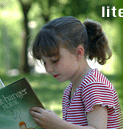These activities are intended to help the students build the oral
language knowledge and understanding necessary for comprehension.
They include the following:
| Narration activities |
- students talk about ideas,
- sequence ideas,
- recount experiences,
- describe familiar situations and events,
- communicate intentions and anticipate in real-life
contexts.
|
| Strategic listening and aural activities |
Before learning to use reading strategies, practise matching
oral strategies, for example, the student listens a text, etc.,
and
- visualise part of it, draws pictures, acts out or paraphrases
what was heard
- predict what may happen next or earlier, suggest the
general context
- use context and syntax to suggest meanings of words,
test possible synonyms
- recognise miscues or errors in the text
- re-tell the story, suggest a title, describe the theme,
the sequence of ideas in the story
- describes the actions used while listening and modify
them
|
| Memory activities |
- recall a word given its meaning and first letter/sound
- recall what they know about a word, picture when they
last heard it, what it may refer to.
- suggest similes and opposites to a word.
- recall words from a semantic category
- are given a title (e.g., why I like ice-cream) and suggest
likely words.
|
| Story completion activities |
- hear part of a text and predict what might happen,
finish it , say how they predicted
- complete a story given a title,
- add to a group story, a paragraph, talk about ideas,
pursue arguments or discussions, activities in which they write
plays or scripts
|
| Vocabulary-expansion activities |
- students add new words and meanings to their oral
vocabulary,
- say when a word isn't understood,
- guess its meaning using its context,
- suggest synonyms and opposites, and
- suggest when they might use the word in the future.
|

